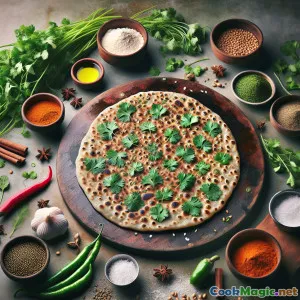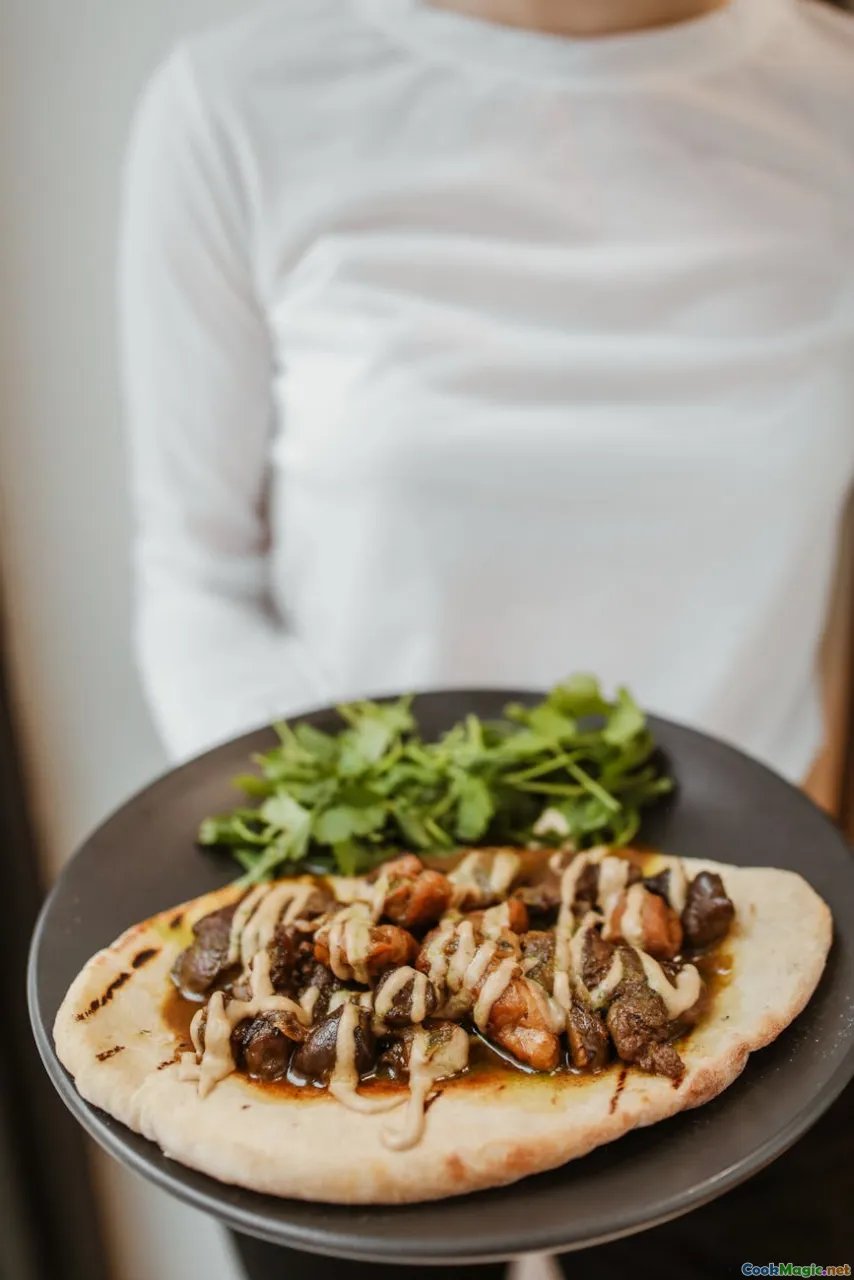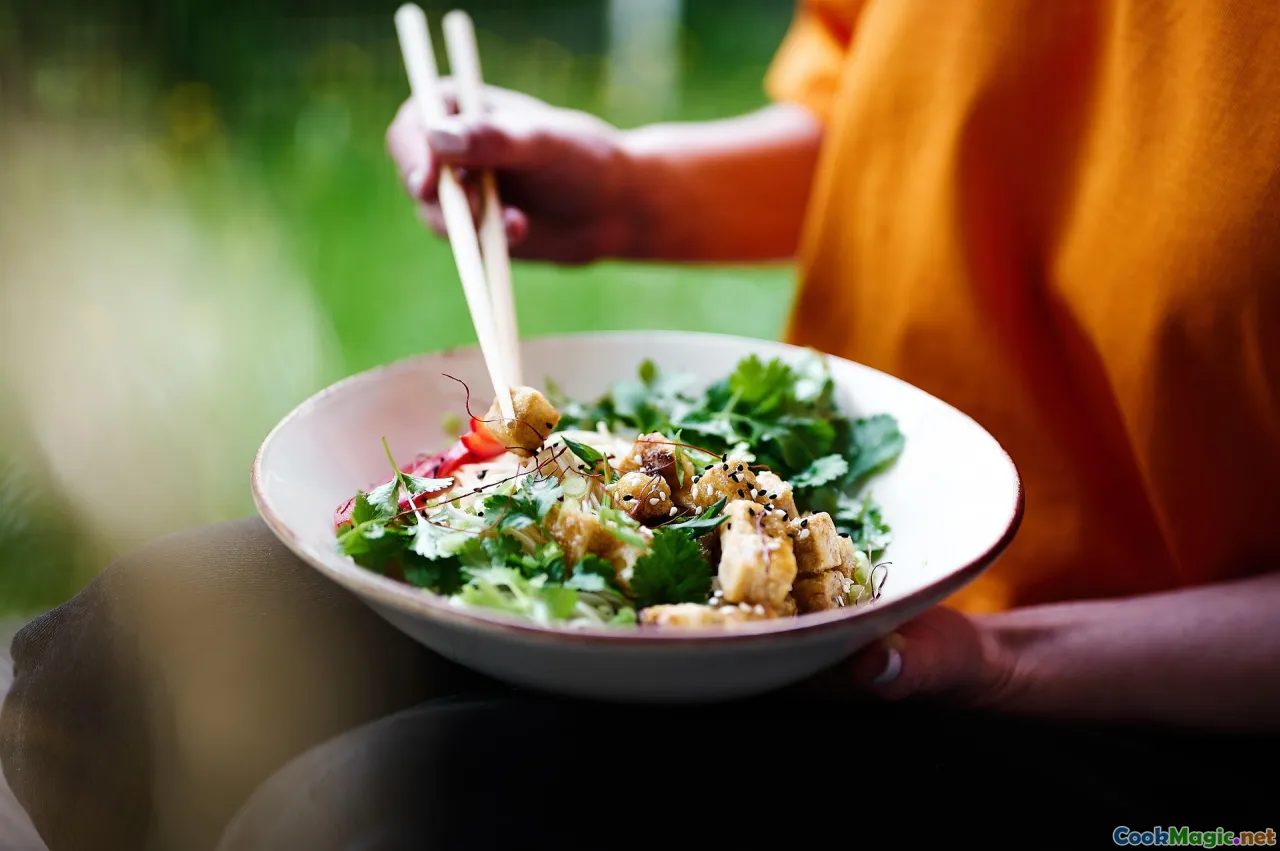
Bánh mì dẹt bổ dưỡng từ Methi, Bajra và Ngò rí
(Wholesome Methi Bajra & Coriander Flatbreads)
(0 Đánh giá)0
935
tháng 8 02, 2025
Báo cáo sự cố
Nguyên liệu
-
200 grams Bột bột mạch nha (ngô trai)
(Finely ground; ideal for roti dough)
-
1 cup Lá rau cần tây tươi dùng trong nấu ăn để tăng hương vị và lợi ích sức khỏe.
(Washed, destemmed, and finely chopped)
-
0.5 cup Lá rau mùi tươi (ngò rí)
(Băm nhỏ)
-
50 grams Bột mì nguyên cám
(To give structure and pliability)
-
1 small Ớt xanh
(băm nhỏ, điều chỉnh theo khẩu vị)
-
1 tsp Hạt thì là
(Adds earthy flavor)
-
0.75 tsp Muối
(Điều chỉnh theo khẩu vị)
-
0.5 tsp Hạt thì là (ajwain)
(Optional for digestive aid)
-
0.5 tsp Bột ớt đỏ
(Optional, for a slight kick)
-
4 tbsp Dầu (dùng cho bột và nấu ăn)
(Divided; any neutral oil)
Nước, as needed
(Finely ground; ideal for roti dough)
(Washed, destemmed, and finely chopped)
(Băm nhỏ)
(To give structure and pliability)
(băm nhỏ, điều chỉnh theo khẩu vị)
(Adds earthy flavor)
(Điều chỉnh theo khẩu vị)
(Optional for digestive aid)
(Optional, for a slight kick)
(Divided; any neutral oil)
Dinh dưỡng
- Khẩu phần: 4
- Kích thước khẩu phần: 2 medium rotis (~120g)
- Calories: 310 kcal
- Carbohydrates: 47 g
- Protein: 7 g
- Fat: 10 g
- Fiber: 7 g
- Sugar: 1 g
- Sodium: 450 mg
- Cholesterol: 0 mg
- Calcium: 65 mg
- Iron: 2.8 mg
Hướng dẫn
-
1 - Prepare greens and spices:
Wash methi and corianders leaves thoroughly; dry and chop finely. Also, chop green chili and gather all spices.
-
2 - Mix Dry Ingredients:
In a large bowl, combine bajra flour, whole wheat flour (if using), salt, cumin seeds, ajwain, and red chili powder.
-
3 - Add greens for flavor:
Stir in chopped methi, coriander, and green chili to the flour mixture for even distribution.
-
4 - Bind dough:
Add 2 tbsp oil. Gradually add water (a few tablespoons at a time), mixing to form a soft, pliable dough. Don’t overwater as bajra flour absorbs quickly and may crack.
-
5 - Rest the Dough:
Cover the dough and rest at room temperature for about 5 minutes to allow flours and greens to hydrate.
-
6 - Shape rotis:
Divide dough into 8 balls. Place between two sheets of parchment or in your hand, gently pat to flatten each into a 4-5 inch disc.
-
7 - Cook on skillet:
Heat skillet or tawa. Cook a roti on medium flame until brown spots appear, brushing each side with oil. Repeat for all.
-
8 - Serve Warm:
Serve immediately with yogurt, raita, pickle, or a rustic vegetable curry.
Wash methi and corianders leaves thoroughly; dry and chop finely. Also, chop green chili and gather all spices.
In a large bowl, combine bajra flour, whole wheat flour (if using), salt, cumin seeds, ajwain, and red chili powder.
Stir in chopped methi, coriander, and green chili to the flour mixture for even distribution.
Add 2 tbsp oil. Gradually add water (a few tablespoons at a time), mixing to form a soft, pliable dough. Don’t overwater as bajra flour absorbs quickly and may crack.
Cover the dough and rest at room temperature for about 5 minutes to allow flours and greens to hydrate.
Divide dough into 8 balls. Place between two sheets of parchment or in your hand, gently pat to flatten each into a 4-5 inch disc.
Heat skillet or tawa. Cook a roti on medium flame until brown spots appear, brushing each side with oil. Repeat for all.
Serve immediately with yogurt, raita, pickle, or a rustic vegetable curry.
Thông tin thêm về: Bánh mì dẹt bổ dưỡng từ Methi, Bajra và Ngò rí
Methi Bajra Dhaniye ki Rotiyaan: The Powerhouse Millets Flatbread
Introduction & Inspiration
In the heartlands of rural India, especially in the northwestern regions, bajra or pearl millet has been a staple food for centuries. Hardy to arid climates and rich in nutrition, its earthy flavor forms the base of nourishing flatbreads that soothe and sustain. By blending it with fresh fenugreek (methi) and coriander (dhaniya), this recipe pays tribute to an age-old farming heritage while echoing modern health goals. Packed with dietary fiber, essential minerals and a blend of vibrant herbs, 'Methi Bajra Dhaniye ki Rotiyaan' reinvent the simple rustic roti into an irresistible, health-forward meal.
Origin Story & Cultural Framework
Pearl millet flour is traditional to regions like Rajasthan, Haryana and rural Gujarat, celebrated for its ability to keep farmers satiated through demanding days. Methi leaves—fragrant and slightly bitter—are also outsize figures in Indian wintertime produce, believed to purify the blood and work wonders on digestion. Coriander leaves provide a sprightly freshness to round out the deeper, earthier notes. In India, mixed green flatbreads fold nutrition and seasonality into every meal, while both gluten-sensitive and mainstream food lovers have ‘discovered’ their virtues in recent years.
Combining ancient millet techniques with aromatic, increasingly global herbs gives this roti a flavor-boosted identity all its own. Unlike their traditional flour counterparts, millet rotis are gluten-free (save for optional wheat flour, just for pliability), making them perfect for those on gluten-restricted regimens.
Culinary Techniques: Tips & Pro Secrets
Achieving the right texture with bajra flour takes a little practice—its gluten-free nature means doughs can be crumbly or dry. Here’s what makes this recipe shine:
- Kneading strategy: Add water very slowly. Methi and coriander release some moisture, so let the greens integrate first before adding more water.
- Rest the dough: Just a few minutes of rest—uncovered—lets the moisture move through the dough, preventing excessive cracks while patting.
- Shaping: Forget the rolling pin. Freshly patted bajra rotis shaped in your palm or with parchment paper avoid sticking and breaking.
Optional twist: Stir in a sprinkling of sesame seeds for extra crunch, or hemp seeds for added protein.
Serving Inspiration & Meals
This roti makes an exceptional canvas for classic accompaniments—cool yogurt, fiery mango pickle, garlic chutney or a bowl of curry (say, baingan bharta or a seasonal lauki ki sabzi). For breakfast, pair with churned salted butter or try rolling them up with crumbled paneer and a drizzle of lemon juice—truly transportive.
Nutrition, Health, & Digestive Benefits
Methi Bajra Dhaniye ki Rotiyaan are a connoisseur’s answer to refined carbs:
- High in fiber & protein thanks to bajra—the king of slow-release grains
- Rich in micronutrients; magnesium and iron promote energy release throughout the day
- Vitamins A & C from coriander and fenugreek
- Very low glycemic index for diabetics or people watching their sugar
Fenugreek provides a gentle bitterness thought to promote hunger and digestion, and carom seeds (if used) are part of the Ayurvedic toolkit for beating gastrointestinal woes. The moderate oil not only makes pattings smooth, but unlocks fat-soluble vitamins from the greens.
Personal Reflections & Modern Usage
As someone passionate about global health foods, I love how 'Methi Bajra Dhaniye ki Rotiyaan' bridge ancestral craft and reflect today’s wellness wisdom. Enjoy them crisp-hot off the griddle, or keep wrapped in kitchen cloth; they travel exceptionally well for work lunches and picnics. Test fresh toppings across world cuisines—an Indian avocado chaat or Korean-style kimchi sandwiches, perhaps. No matter where you serve them, these rotis embody heritage and innovation in every bite.
Final Tips
- Prepare dough fresh each time—refrigeration tends to toughen millet dough.
- Use a heavy tava for ropust browning and even cooking.
- Switch up the herbs: Replace coriander with parsley/mint for a new note.
- Roll small batches and keep warm, brushed with a whisper of ghee!
Above all, this recipe makes simple, ancient ingredients wholly new. Adventure into plant-based breads, guided by generational wisdom—and make every meal joyously nourishing!

























